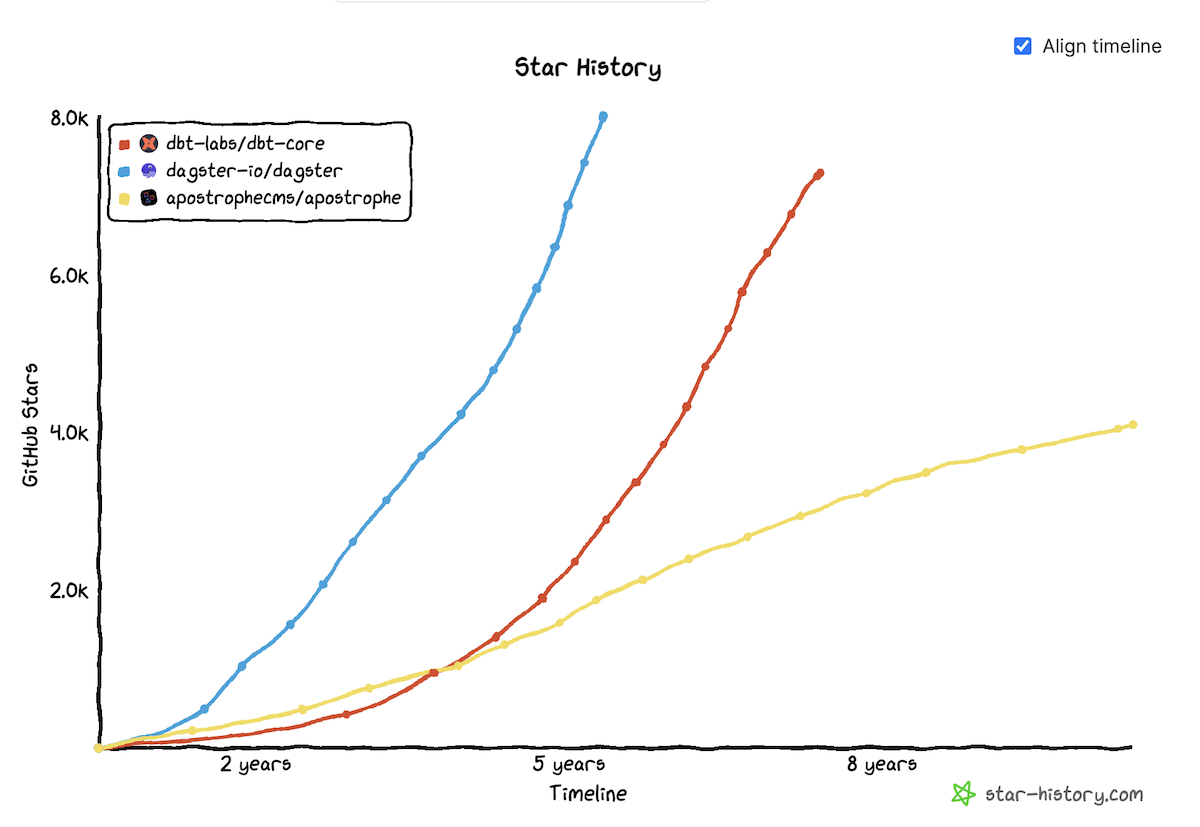If you are unfamiliar with these, you can think of them as the “like” button on an open-source project. When developers find a project they like, they can bookmark it with a star or simply “star” the repo as a general vote of appreciation.
So why do startups with open-source projects — like our company’s Dagster — fret about GitHub stars? Well, VC firms have historically placed a decent amount of weight on these in their investment decisions. Since it is hard to properly ascertain the adoption of open-source solutions, GitHub stars act as an imperfect proxy. The more GitHub stars your startup garners, the more likely you are to close a successful round.
For example, GitHub stars can tell the story of the front-end framework war between Angular and React:

(Image created via star-history.com)
Here is a chart of three open-source projects: Dagster, dbt and Apostrophe. The graph was created using star-history.com. As you can see, GitHub stars appear to tell a story in terms of the trajectory and growth rate of each project.

(Image created via star-history.com)
How much is a GitHub star worth?
But here’s the rub: Just like you can buy fake Instagram followers, you can buy fake GitHub stars. In fact, any social signal online can be purchased — you name it: Facebook friends, Twitter followers, IMDb reviews, Reddit upvotes. Social signals you have never even heard of can be purchased by unscrupulous people.
Sure enough, a small number of open-source projects have been gaming the system to make their projects look way more popular than they are. One thousand GitHub stars will cost you as little as $84 on some platforms (that I don’t wish to promote here by name, but you can find them with a simple Google search).
So how do you play when the field is rigged? Do you join the cheaters and artificially pump up your numbers? At Elementl, we decided to take the high road and apply some data science to the problem, building both a simple heuristic and a more sophisticated unsupervised clustering approach.
We published the results earlier this year entitled “Tracking the Fake GitHub Star Black Market with Dagster, dbt and BigQuery.” The post offers a way to test any GitHub repo’s stars to see how many appear to be fake.
So, do we ignore GitHub stars?
Should you worry about GitHub stars if you are working on getting funding for your open-source startup?
Yes and no.
- GitHub stars are still an important internal metric you should track as they provide a picture of who is interested in and tracking your project.
- GitHub stars broadcast to the world which projects are trending and which are running out of steam.
At the same time:
- Since startups will have relatively few stars, the numbers are much easier to game. But fakes are also fairly easy to spot, as we demonstrated in our blog post.
- With renewed awareness of the option to simply buy GitHub stars, we hope that investors are now wiser and you would not want to compromise your fundraising efforts by cheating.
My advice: Take the high road, and focus on attracting loyal open-source users who will support your project and help promote it in the community. Add a footnote to your pitch deck to explain your position and educate your investor audience, and call out any competitors who are attempting to game the system.
And best of luck with that next funding round.
Join our growing Slack community
Join 5,000 tech professionals and entrepreneurs in our community Slack today!
Donate to the Journalism Fund
Your support powers our independent journalism. Unlike most business-media outlets, we don’t have a paywall. Instead, we count on your personal and organizational contributions.

Mayor Bowser: Tech can help DC build a stronger, more self-sufficient economy

Comcast introduces ultra-low lag Xfinity internet that boosts experiences with Meta, NVIDIA and Valve

Maryland firms score $5M to manufacture everything from soup to nanofiber



